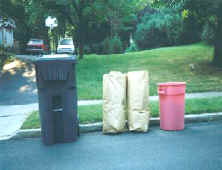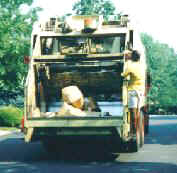![]() RECYCLING ISSUES Petrochemical products and other hazardous materials present a big challenge to safe recycling. It is much easier to recycling or compost organic, untreated materials. More information below.
RECYCLING ISSUES Petrochemical products and other hazardous materials present a big challenge to safe recycling. It is much easier to recycling or compost organic, untreated materials. More information below.


SEE ZWA'S...
![]() Waste & Recycle News & Organizations
Waste & Recycle News & Organizations![]() Waste & Recycling Statistics
Waste & Recycling Statistics![]() Economics Of Waste
Economics Of Waste![]() More Photos
More Photos
IS RECYCLING ALWAYS GOOD?
No. Recycling is not a "good thing" in itself, as we are faced with an avalanche of recycled materials that takes tons of time, energy, and money to repurpose. It is clear that we need to take a comprehensive approach to materials management and zero waste. Climate change and toxic build-up in our bodies and the environment demand this.
First, we need to minimize the production of goods and services and require people, as much as possible, to become more self-reliant and to, for example, carry their own bags, bottles, and other containers.
Second, we need to ban products that are unsafe and unnecessary, which is most of them, considering the amount of toxic materials (i.e., plastics, etc.) the government allows to be sold in the marketplace.
Third, we need to support "safe" recycling through all means necessary.
_________________________________________
Many polluting industries receive government support in order to succeed. Many of these industries extract virgin materials and devastate the environment, such as logging and mining companies. Unfortunately, recycling is too often left to fend for itself. Many recycling activists lobby for government support and legislation for return/deposit (bottle bills), producer-take back, and minimum contents standards. The results have been disappointing. It is time for recycling to receive the government support it needs and deserves. See: Economics Of Waste
The fundamental rule of recycling, mirrors that of medicine...first, do no harm. What makes you feel good, may not be good for the environment. Some forms of recycling are little more than waste disposal, particularly if petrochemicals such as plastics and other toxics are involved. Many materials we use every day are unsafe to manufacture, use, and/or recycle.
In the U.S. most industrial chemicals are not tested for safety by the EPA.See Wastes & Toxics. Therefore, the recycling of plastics and other products manufactured using petrochemicals and other toxic components, should be preceded by the elimination of these toxic components to the greatest extent possible.
Composting food, sewage sludge, and other biodegradables that contain toxics or synthetic chemicals can be unsafe. The use of bottom and fly incinerator ash in the manufacture of materials (often used in building and road construction) can be unsafe. The ash can contain toxic heavy metals (chromium, cadmium, lead, arsenic, zinc, and other metals) as well as organic compounds (PCBs, dioxins, benzene, and other cancer-causing organics). See Incinerators. The burning of landfill gas for electricity is not practicing "clean energy," but instead releasing an array of toxic emissions. See: Landfills
Beneficial Use? As some governments and business look for cheap disposal alternatives to landfills and incinerators, it is increasing common that waste disposal masquerades as recycling. The term, "Beneficial Use" of waste, requires extreme caution. The EPA and state environmental agencies often permit the unsafe recycling and reuse of waste under the guise of "Beneficial Use." An example of a Beneficial Use is the burning of tires and hazardous waste for fuel, as well as the examples listed below.
GOOD EXAMPLES OF BAD RECYCLING & COMPOSTING ...
- Petroleum products should be eliminated as much as possible, not recycled.
- substitute asphalt roofs with metal - http://metalroofmanufacturers.com/
- Fluoridation of Municipal Water
- Recycling Radioactive Waste
- Toxic Waste in Fertilizer:
- Fly Ash Added To Building Materials & Fertilizer
- TOXIC ALERT: Hazardous Waste & "Treatment" Site lists
- 101 Cement Kilns throughout the U.S. 'recycle' (burn) Hazardous Waste - See Incinerator page
- Phospho-Gypsum: a problem waste of the fertilizer industry, becomes a problem in building materials-exposure to cadmium and radioactivity
- RECYCLING LEACHATE BACK THROUGH A LANDFILL: Based on the available literature, pumping leachate back through a landfill causes increased decomposition, and it seems logical that it would also create a super toxic leachate. In addition, it would most likely accelerate the decomposition of the liner itself, thereby allowing leachate to contaminate ground water at an increased rate.
- DEGRADABLE PLASTICS: Creates Harmful Plastic Dust (see Plastics)
EPA - Fertilizers, Environmental Fact Sheets: Waste-Derived Fertilizers - December 1997
- http://www.epa.gov/epaoswer/hazwaste/recycle/fertiliz.txt
- http://www.epa.gov/epaoswer/hazwaste/recycle/metafert.txt
PRODUCER RESPONSIBILITY (TAKE-BACK) Bottle bills are the U.S. version of take-backs. For governments who implement "producer responsibility" or "take-back" (Green Dot in Germany) programs, there maynot be laws, regulations, and/or enforcement procedures are in place to prevent unsafe disposal, export of recyclables, or guaranteed markets for recyclables.
- GrassRoots Recycling Network Extended Producer Responsibility (EPR) is the extension of the responsibility of producers for the environmental impacts of their products and packaging to the entire product life cycle -- and especially for their take-back, recycling, and disposal. EPR is based on the ‘polluter pays’ principle.
- U.S. EPA's Extended Product Responsibility
- Raymond's Take Bake page
- Germany Amends Package Ordinance
- Container Recycling Institute (promotes bottle bills)
RECYCLING NON-PROFIT & TRADE ORGANIZATIONS: